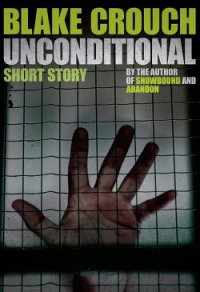The Pain of Others - Crouch Blake (серии книг читать бесплатно TXT) 📗
His face paled slightly through the Powers glow. “Who are you?”
“I was there, Chase.”
“Where? What are you talking about?”
She leaned over, whispered in his ear: “Room 5212 at the Grove Park Inn when you met with Arnold LeBreck and hired him to murder your wife. I was in the closet. I heard everything.”
He drew back, the noise of the chophouse swelling—thirty separate conversations intermingled with the clink of glassware and china.
She said, “Last Sunday morning, I went to your house in Montford. I told your wife everything—”
“Oh Jesus.”
“—and when I left, she was holding a shotgun on Mr. LeBreck and on the verge of calling the police. I should never have left her…
“But as I just mentioned, nothing in the papers. No sign of Daphne. So I’m sitting here wondering what happened, but before you answer, let me tell you that I’ve written a letter to the Asheville Police Department providing a firsthand account, and it will be delivered tomorrow by a friend of mine should I become scarce.”
This last part was a lie. She’d only just thought of it.
Chase drained his whiskey in one shot and slammed the glass down on the bar.
“Why won’t you go back to your house, Chase? What did you do there on Sunday morning after I left? What did you do to your wife?”
Chase grabbed the side of the bar to steady his hands. He closed his eyes, opened them again. The barkeep set another Powers in front of him and took away his cold, untouched dinner plate.
“You have no idea what you’ve done,” he said.
“I’m going back to your house,” Letty said. “Tonight. Am I going to find her dead? Why won’t you tell me, instead of sitting here in denial, pretending none of this has happened?”
Chase stared down the length of the bar for a full minute, then rubbed his palms into his eyes, smearing a bit of eyeliner.
Another greedy sip of Powers and he said, “I met Daphne after my first wife died. Skyler was two, and my parents kept him for a week, made me take a trip. We met in Oranjestad. You know Aruba? She could be so engaging when she wanted to be.
“We’d been married a year when I caught the first glimpse of what she really was. Friend of ours had gotten divorced and Daphne was consoling her on the telephone. It was a small thing, but I suddenly realized what she was doing. My wife had this way of talking to you so you’d think she was comforting you when she was actually salting your wounds. I saw her do it again and again. Even with me. With my son. It was like the pain of others attracted her. Filled her up with this black joy. Please,” he slurred. “Don’t go back there. Just leave it alone.”
“So it turns out your wife’s a bitch after all, and you want her dead. That’s so original.” Letty had a strong desire to take the Beretta 84 pistol out of her purse and jam it into Chase’s ribs, make him come along with her, rub his face in whatever he’d done. Instead, she climbed down from the barstool, said, “Have a wonderful night of freedom, Chase. It may be your last.”
Letty parked her 4Runner in the cul-de-sac and walked up the driveway toward the Rochefort residence. The rain had further dissolved into a cold, fine mist, and all she could see of the Victorian was the lamplight that pushed through a row of tall, arched windows on the second floor. At the front door, she peered through a panel of stained glass, saw a sliver of the lowlit hallway—empty.
She knocked on the door and waited, but no one came.
The third window on the covered porch slid open. She lifted the shade, saw the living room illuminated by a sole piano lamp on the baby grand. Climbed over the back of the upholstered sofa and closed the window behind her.
“Daphne?”
The hardwood groaned under her footsteps as she moved through the living room and up the stairs. The bed in the master suite looked slept in, covers thrown back, sheets wrinkled, clothes hanging off the sides.
Letty went downstairs into the kitchen, and as she stared into a sinkful of dirty dishes, noticed the music—some soothing adagios—drifting up from a remote corner of the house.
She walked around the island to a closed door near the breakfast nook.
Opened it. The music strengthening.
Steps descended into a subterranean level of the residence, and she followed them down until she reached a checkerboard floor made of limestone composite. To the left, a washing machine and dryer stood in the utility alcove surrounded by hampers of unwashed laundry that reeked of mildew.
Letty went right, the music getting louder.
Rounded a corner and stopped.
The brick room was twenty-by-twenty feet and lined with metal wineracks, the top rows of bottles glazed with dust.
Beside an easel lay a Bose CD player, a set of Wusthof kitchen knives, and boxes of gauze and bandages. Hanging from the ceiling of the wine cellar by a chain under her arms—Letty’s eyes welled up—Daphne.
Then the lifeless body shifted and released a pitiful wail.
Letty recognized the tattoo of the strangling hands as Arnold LeBreck painfully lifted his head and fixed his eyes upon Letty, and then something behind her.
Letty’s stomach fell.
She spun around.
Daphne stood five feet away wearing a black rubber apron streaked with paint or blood and a white surgical mask, her black hair pinned up except for a few loose strands that splayed across her shoulders.
She pointed a shotgun at Letty’s face, and something in that black hole suggested the flawed philosophical underpinnings that had landed Letty in this moment. No more hating herself, no avoiding the mirror, letting her father whisper her to sleep, no books on learning to love yourself or striving to become something her DNA could not support. She was facing down a shotgun, on the verge of an awful death, not because she was an evil person, but because she wasn’t evil enough.
Letty thought fast. “Oh, thank God. You’re not hurt.”
Daphne said through the mask, “What are you doing here?”
“Making sure you’re okay. I ran into Chase—”
“What’d he tell you? I warned him to let me have a week with Arnold, and then I’d be out of his life.”
“He didn’t tell me anything, Daphne. That’s why I came over. To check on you.”
Arnold moaned and twitched, managed to get himself swinging back and forth over the wide drain in the floor like a pendulum.
“That man was going to kill me,” Daphne said.
“I know, honey. I saved you. Remember?” The smell was staggering, Letty’s eyes beginning to water, her stomach to churn. “Well, I see you’re okay, so I’ll slip out, let you—”
“You shouldn’t have come back.”
“I didn’t see anything in the papers about your husband or Arnold. I thought something had happened to you after I left last Sunday.”
Daphne just stared at her. The facemask sucking in and out. At last she said, “You think what I’m doing is—”
“No, no, no. I’m not here to…that man was going to kill you. He deserves whatever happens to him. Think of all the other people he’s murdered for money.”
“You saw my painting?”
“Um, yeah.”
“What do you think?”
“What do I think?”
“Do you like it?”
“Oh, yes. It’s … thought-provoking and—”
“Some parts of Arnold’s portrait are actually painted with Arnold.”
Daphne’s arms sagged with the weight of the shotgun, the barrel now aligned with Letty’s throat.
“I saved your life,” Letty said.
“And I meant what I said. I won’t ever forget it. Now go on into the wine cellar. Just push Arnold back and stand over the drain.”
“Daphne—”
“You’d be a lovely subject.”
Letty’s right hand grazed the zipper of her all-time favorite score—a Chanel quilted leather handbag she’d stolen out of the Grand Hyatt in New York City. Thirty-five hundred in Saks Fifth Avenue.




